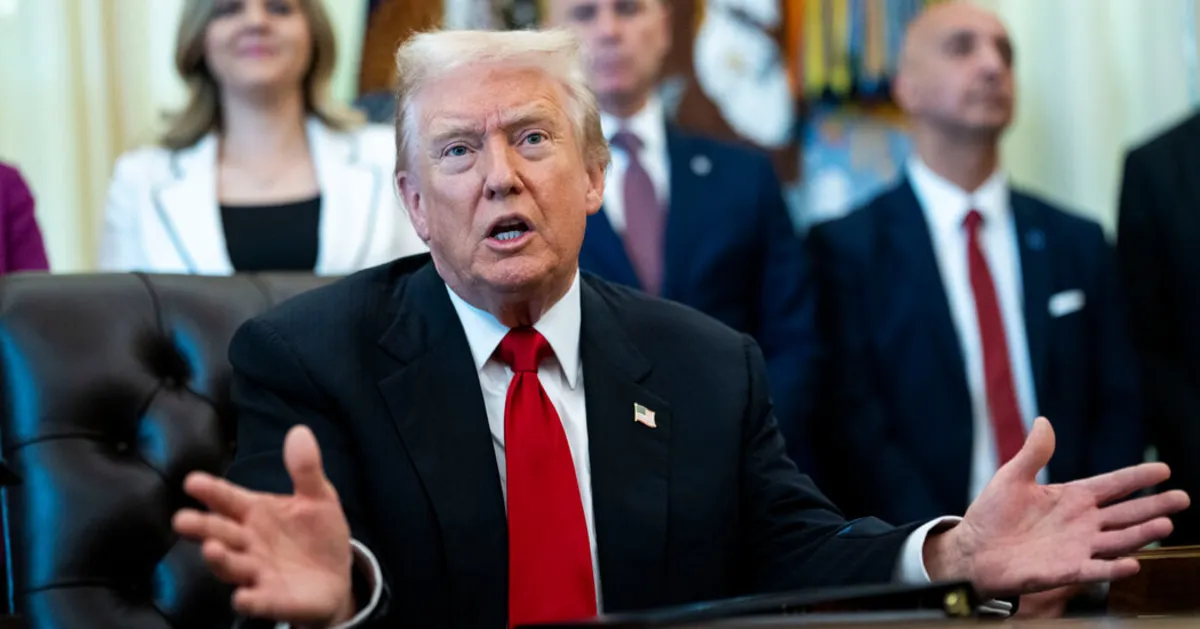
In recent public statements, President Trump has boasted about the substantial revenue his tariffs are expected to generate, declaring it to be a “BONANZA FOR AMERICA!!!” on social media. However, during a pivotal Supreme Court hearing on Wednesday, his lawyer, D. John Sauer, presented a contrasting perspective, asserting that the primary purpose of the tariffs is to achieve specific policy goals rather than to generate revenue. “The fact that they raise revenue,” he stated, “is only incidental.” This legal distinction could prove crucial for the Supreme Court's ruling.
If the Supreme Court determines that the tariffs function as a type of tax, it could strike them down, given that the Constitution grants the power to tax exclusively to Congress, not the president. Conversely, if the justices classify the tariffs as diplomatic tools within the president’s foreign policy prerogative, they may uphold them. Legal experts question whether the justices will consider this apparent contradiction, noting that in previous cases, such as those involving President Obama and his Affordable Care Act, the Court has overlooked similar inconsistencies. However, this case may be different due to the manner in which Mr. Sauer presented his arguments.
Historically, the Supreme Court has paid little attention to the public remarks of presidents, preferring to focus on the legal arguments presented in court. For instance, during arguments concerning President Obama’s travel ban from predominantly Muslim countries, the justices disregarded his public statements. However, in an unusual turn, the government’s main brief in the current case included extensive quotes from President Trump’s public statements, which may influence the Court's deliberations. The brief stated, “One year ago, the United States was a dead country, and now, because of the trillions of dollars being paid by countries that have so badly abused us, America is a strong, financially viable and respected country.” It further warned that “the economic consequences would be ruinous” if the Court required the administration to revoke its tariff agreements.
Jonathan Adler, a law professor at William & Mary, emphasized that the inclusion of Trump’s remarks in the government brief alters the typical judicial approach. “In effect,” he noted, “the government brief opened the door to considering the president’s statements by including them in the briefing, and that may enable the court to consider the president’s remarks when it would normally be very reluctant to do so.” In contrast, the challengers of the tariffs referenced Trump’s statements only briefly, potentially limiting their impact.
The decision to include Trump’s statements may have been an attempt at managing client expectations, allowing the president to express his views in his characteristic style before delving into legal arguments. However, this strategy might backfire. The solicitor general’s office declined to comment on this approach. Legal scholars like Kate Shaw, a law professor at the University of Pennsylvania, argue in her 2017 article “Beyond the Bully Pulpit: Presidential Speech in the Courts,” that courts should generally not hold presidents accountable for political statements. “Binding presidents to their claims and representations has an undeniable appeal,” she wrote, cautioning against giving legal weight to statements meant for political engagement rather than legal argumentation.
In a recent interview, Shaw suggested that if a president engages in bad faith, their statements may become subject to scrutiny in legal contexts. “I offered that framework — one that sought to give presidents leeway to speak to the public freely and often informally without constant worry that their words would imperil their legal positions,” she explained. “When presidents stop doing that, as I think this president has, in my view, courts are entirely justified in using presidents’ words against them.” Historically, the Supreme Court has been hesitant to challenge presidential statements, as seen in the 2012 ruling that upheld the Affordable Care Act despite President Obama’s claims that it was not a tax.
During Wednesday's arguments, a similar exchange occurred about the nature of the tariffs. Chief Justice John G. Roberts Jr. pointed out, “It’s been suggested that the tariffs are responsible for significant reduction in our deficit,” implying that they serve a revenue-generating function. Sauer countered that while tariffs indeed raise revenue incidentally, their primary function is regulatory rather than fiscal. Following the hearing, President Trump reiterated in a speech that “my tariffs are bringing in hundreds of billions of dollars,” underscoring his view of tariffs as a financial boon.
Harold Koh, a former dean of Yale Law School, who filed a brief supporting the challengers, argued that the Court should reject the administration’s reliance on purported emergencies to justify its tariff strategies. The ongoing deliberations surrounding these tariffs not only highlight the complexities of legal definitions but also the intricate relationship between presidential rhetoric and judicial interpretation.